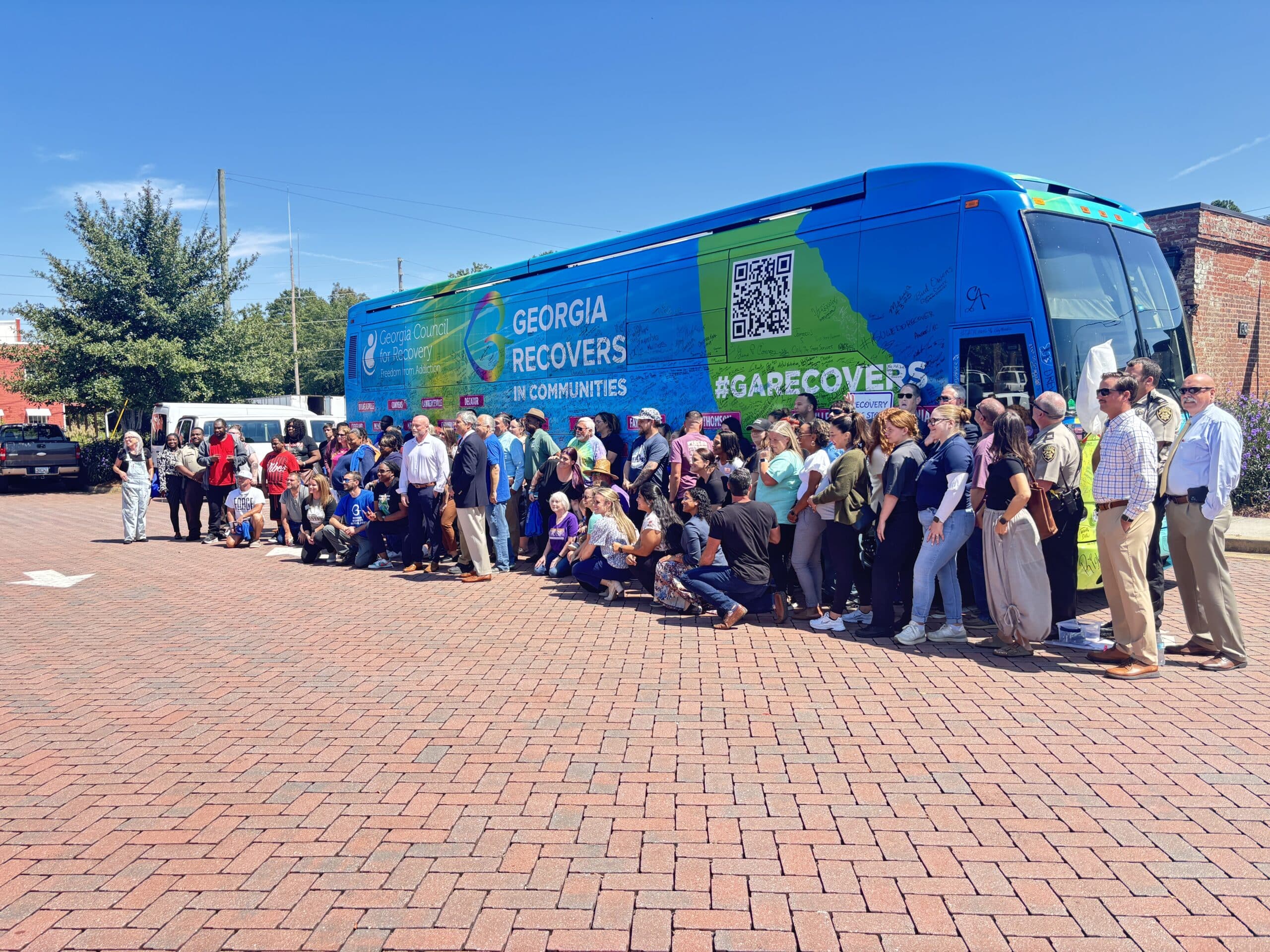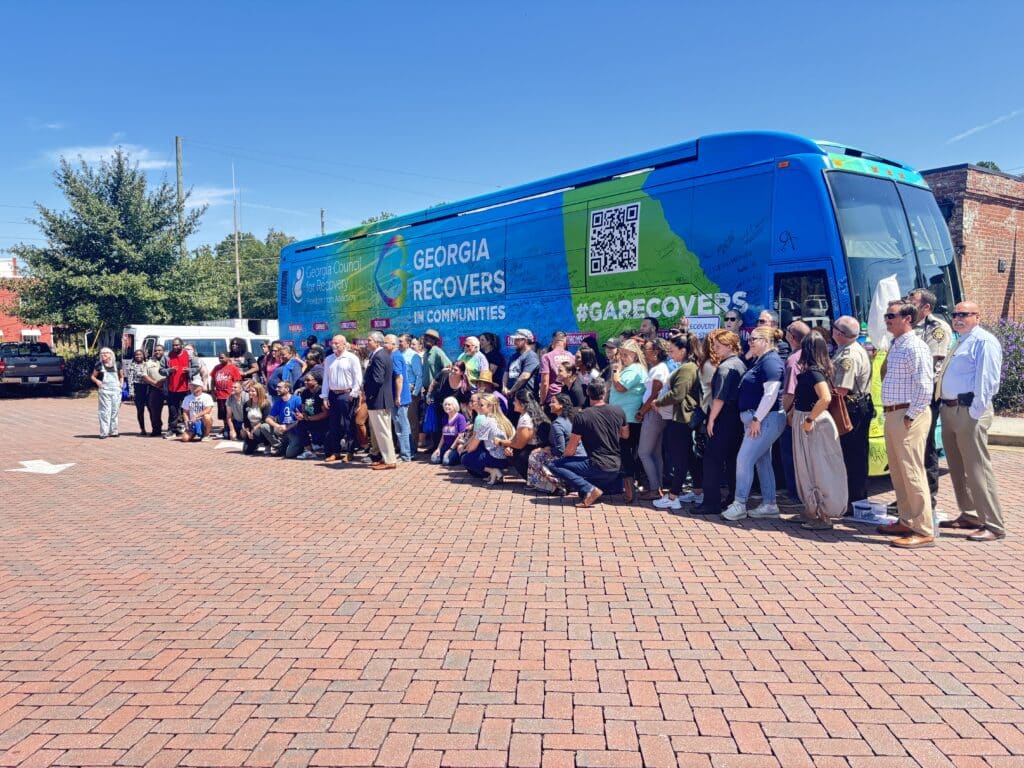
Menu
Georgia Recovers Bus Tour: Driving Hope, Breaking Stigma
crowndigital
September 11, 2025
Community

Every September, as leaves begin to change, Georgia lights up with more than just autumn’s colors — the state embarks on a journey of recovery, unity, and understanding through the Georgia Recovers Bus Tour. Sponsored by the Georgia Department of Behavioral Health and Developmental Disabilities (DBHDD) and led by the Georgia Council for Recovery (GC4R), this mobile event isn’t just a bus on the road. It’s a moving message: “Recovery is Real.” Facebook+4joinnia.com+4Dalton, GA+4
What Is the Bus Tour?
The Georgia Recovers Bus Tour is a statewide initiative making dozens of stops—75 stops in many years—across cities and towns in Georgia during National Recovery Month. gc4recovery.org+3Dalton, GA+3joinnia.com+3
At each stop, the tour brings together people in recovery, their families, health service providers, policymakers, local advocacy groups, and community members. The events are free and open to the public. Dalton, GA+2Covnews+2
Activities usually include:
Speeches or panel discussions with local leaders and people with lived experience in recovery. Dalton, GA+1
Signing the bus: community members add their names as a show of solidarity and support. Covnews+1
Presentations of overdose reversal tools like naloxone to local authorities in some places. Dalton, GA+1
Why It Matters
The Bus Tour is more than a promotional event. It plays a critical role in addressing addiction in Georgia, offering multiple layers of impact:
Reducing Stigma
By centering people with lived experience, recovery stories, and public recognition, the tour helps erase shame. When recovery is visible, it helps others believe it’s possible—and allows communities to support people rather than marginalize them.Connecting Services with Communities
Local resources and needs vary. Some towns need more mental health support, others need more access to treatment or recovery community organizations (RCOs). The tour brings awareness to what’s working and what’s missing, and often provides resources or connections on the spot. Dalton, GA+1Policy & Public Safety
Stops frequently include policy discussions—how state and local systems can better support recovery, how overdose prevention tools like naloxone can be made more widely and publicly available, and how recovery community organizations can help fill gaps. Dalton, GA+2gc4recovery.org+2Celebrating Recovery
It’s powerful to see people who are years into recovery speak openly—and be celebrated. It gives hope to those still struggling and shows communities the positive outcome of perseverance, treatment, and support.
Recent Highlights & Impact
Here are a few recent examples showing how the tour has made a difference:
In Dalton, the Bus Tour visited City Hall, where a panel of local stakeholders discussed how addiction affects the community, and the event featured recovery community members. Dalton, GA
In Covington, the Bus Tour held a public gathering in the Courthouse Square where local leaders read proclamations declaring September as National Recovery Month. Community members were given naloxone kits and encouraged to sign the bus to show their support. Covnews
In Dalton again, during another stop, officials and members of Georgia recovery groups presented overdose reversal kits (naloxone), discussed the importance of multiple pathways in recovery, and emphasized the need for community support systems. Dalton, GA+1
How You Can Get Involved
If you or your community are interested, here are ways to take part:
Attend a stop when the tour passes through your area. It’s free, open to all, and a chance to learn, share, and connect.
Spread the word on social media or through local groups. The more people know about the tour, the more impact it can have.
Volunteer or partner locally: recovery organizations, churches, nonprofits—there are often opportunities to help host events, distribute resources like naloxone, or support people in recovery.
Advocate: Ask local leaders to support recovery services, make naloxone available in public places, remove barriers to treatment, and recognize recovery community efforts. Even small steps help build momentum.
A Closer Look: Recovery Is Real
One of the powerful messages of the tour is that “Recovery is Real.” This is more than a slogan. It’s grounded in the stories of people who have battled addiction and come out on the other side—not always perfectly, not without setbacks, but still moving forward. These personal narratives are crucial, because they show:
Addiction doesn’t have to define someone’s life.
Recovery can look different for different people. Some recover through peer support groups, others through clinical treatment, others through faith-based or holistic routes.
It’s a long journey, often with ups and downs, but support (from friends, family, organizations, community) can make all the difference.
When communities witness these stories, when they see recovery celebrated instead of hidden, stigma gets chipped away. And that leads to more people seeking help, more resources being made available, more lives saved.
Challenges & What’s Next
While the Bus Tour does a lot of good, it also points out what still needs work:
Access to care remains uneven: in rural areas there may be fewer recovery services, longer travel distances, or fewer peer support groups.
Sustainability of support systems: it’s one thing to have attention during National Recovery Month, but maintaining programs, funding, and community engagement all year is tougher.
Stigma and misunderstanding still exist: some people still view addiction through moralistic frames instead of medical or public health perspectives. Changing that mindset takes ongoing effort.
Moving forward, there’s opportunity to:
Expand recovery community organizations (RCOs) so they’re more accessible in every county.
Ensure naloxone and other overdose reversal tools are easily available in public spaces.
Strengthen coordination among service providers, public health, law enforcement, and community groups.
Keep pushing for policies that support recovery: funding, insurance coverage, harm reduction.
Final Thoughts
The Georgia Recovers Bus Tour is more than a bus drive—it’s a movement. It’s bringing conversations, visibility, resources, and hope into towns and cities where addiction impacts many. It’s tugging on change: policy, hearts, perceptions.
If you ever feel alone in the fight against addiction—whether personally or as someone caring for a loved one—look for the Bus Tour. Attend a stop. Listen to a story. Add your name to the side of the bus. Because when we recognize that recovery is real, we affirm that no one has to suffer in silence.



Tags :
Share This :

